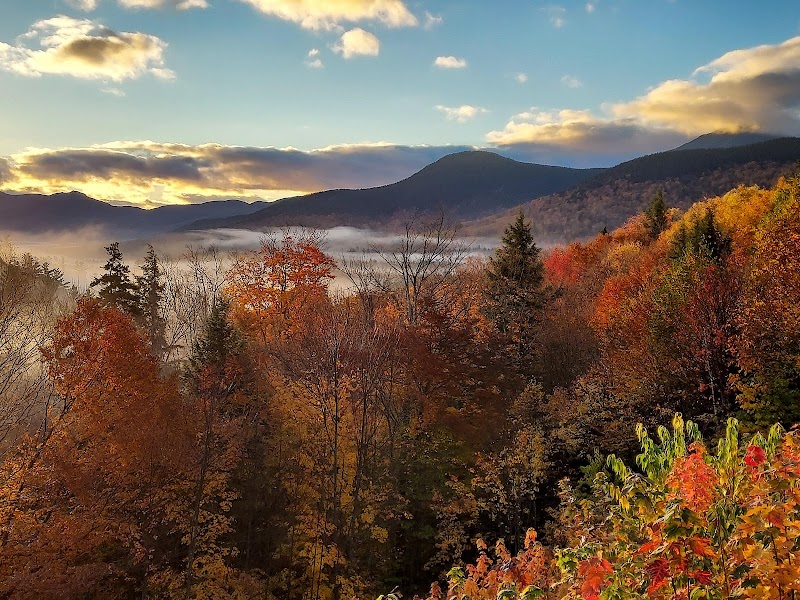Best Alpine Lakes Hikes Near Franconia: Exploring Clear Waters and Mountain Views in the White Mountains
Explore the best alpine lakes near Franconia, where clear waters meet dramatic mountain views in New Hampshire’s White Mountains. This guide balances exhilarating hikes with practical advice, helping you plan a rewarding adventure filled with pristine scenery and invigorating trails.
Start Early for Cooler Temperatures
Begin hikes in the morning to avoid afternoon heat and afternoon storms common in the White Mountains, especially in summer.
Footwear with Traction and Support
Wear hiking boots with good ankle support and traction to handle rocky and often wet terrain along alpine lake trails.
Carry Ample Water and Filtration
Bring enough water; consider a lightweight filter for refilling from streams to stay hydrated on longer routes.
Watch Weather Closely
Mountain weather can shift rapidly—check forecasts and be prepared with rain gear and warm layers regardless of season.
Best Alpine Lakes Hikes Near Franconia: Exploring Clear Waters and Mountain Views in the White Mountains
The rugged White Mountains stretch across New Hampshire with an inviting challenge: alpine lakes tucked among soaring peaks just beyond Franconia. These lakes are alive with clear waters that dare you to pause and reflect, framed by mountains standing fiercely, holding the sky in place. From casual wanderers to hardened hikers, the best alpine lake trails near Franconia offer a range of terrain — forested paths that whisper underfoot, rocky ledges that test your steady footing, and switchbacks that pull you steadily upward.
Start with the Franconia Loop’s hidden gem, Echo Lake. A modest 3.5-mile round trip, it offers roughly 400 feet of elevation gain along well-maintained paths. The lake’s mirror surface rebounds the cliffs that guard it, the trees leaning in as if to keep watch. Early morning light reveals the lake’s true clarity and the faintest ripple from a breeze, making hydration stops an ideal chance to catch your breath and take in the raw landscape.
For those ready to push harder, Avalanche Lake is a 4.7-mile trek that commands respect. The trail climbs 700 feet, weaving through thick spruce and fir, where the scent of damp earth and resin pushes you forward. Avalanche Lake doesn’t reveal itself until the final moments, framed by steep walls that loom silently, its waters cold and fierce as the mountain itself. Scrambling over boulders is required to reach the far shore, so sturdy boots are essential.
Lonesome Lake presents a balanced challenge at nearly 5 miles round trip with a 1,000-foot ascent. The trail slices through dense forest before opening to broad views of the Presidential Range. The lake, shaped by glaciers and time, offers clear reflections and a flat shore perfect for breaks or a quick meal. The calm water seems to listen, its quiet only interrupted by the occasional loon or the rustling pines.
Planning your hike means timing it well. Early mornings and late afternoons provide cooler temperatures and softer light, but always be prepared for sudden weather swings—mountains hold their own rules. Staying hydrated is key; carry enough water to cover every mile and consider a filtration system for refilling at streams along the way. Footwear with good grip and ankle support guards against uneven terrain and aggressive roots.
These alpine lakes are not just scenic stops; they are the pulse points of this wild land. They demand respect, a willingness to move steadily, and an openness to nature that is fiercely itself. By staying aware, well-prepared, and patient, you not only reach these shimmering waters but also engage fully with the mountain’s enduring spirit.
Nearby Trips
All Adventures
Boat Charters
Water Activities
Adventures near Lincoln
Discover the unique and memorable adventures that make Lincoln special.
Frequently Asked Questions
Are alpine lakes near Franconia accessible year-round?
Most alpine lake trails are accessible from late spring through early fall. Winter approaches require snowshoes or crampons and advanced skills due to snow accumulation and ice.
What wildlife might I encounter on these hikes?
Expect to see species like white-tailed deer, black bears (rarely and from a distance), red squirrels, and various bird species including loons and warblers near lakes.
Are dogs allowed on these trails?
Dogs are permitted but must be kept on leash due to local wildlife and trail regulations. Always carry waste bags to minimize environmental impact.
Is camping permitted near these alpine lakes?
Camping is allowed within designated areas in the White Mountain National Forest. Some lake vicinities restrict camping to protect fragile ecosystems, so check local regulations before planning overnight stays.
What are lesser-known viewpoints on these hikes?
On the Avalanche Lake trail, beyond the lake itself, the ledges above the lake offer quieter, expansive views without the usual crowds seen at popular overlooks.
How should I prepare for sudden weather changes?
Bring rain gear and extra layers, start early to avoid afternoon storms, and keep an eye on weather apps or ranger stations for real-time updates.
Recommended Gear
Hiking Boots
Provides traction and ankle support essential on rocky, uneven alpine trails.
Water Filtration System
Allows refilling from streams, reducing the need to carry heavy water loads.
Layered Clothing
Necessary for adapting to rapid temperature changes common in mountain environments.
Trekking Poles
Help steady footing on variable terrain, especially helpful for descents or scrambling over boulders.
Local Insights
Hidden Gems
- "The ledges above Avalanche Lake provide quiet vantage points away from main crowds."
- "A short detour from the Franconia Loop leads to Artist's Bluff, a favorite for panoramic views of Echo Lake."
Wildlife
- "Moose are occasionally spotted near lower elevation lakes during twilight hours."
- "Migratory birds such as the common loon add audible life to alpine lake mornings."
History
"The White Mountains have a history of logging and early tourism development. Many trails follow paths first carved by 19th-century hikers and surveyors mapping the rugged terrain."

